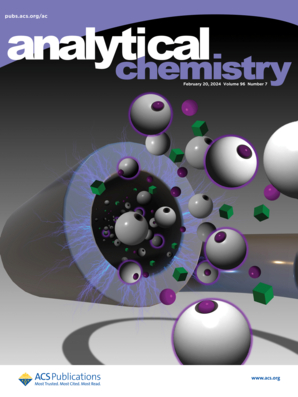Sensor-Aided Rapid Identification of Plastic-Degrading Bacterial Strains.
IF 6.7
1区 化学
Q1 CHEMISTRY, ANALYTICAL
引用次数: 0
Abstract
Biodegradation has been highlighted as a promising strategy to cope with the worldwide plastic waste problems. However, its widespread application remains a major challenge, since the identification of the bacterial strains that are capable of efficiently degrading plastics from various bacterial choices is rather time-consuming. Herein, we report on a novel and universal strategy for rapid identification of plastic-degrading bacteria by using sensor technology. The proposed method is based on the biodegradation-induced Ca2+ ion release, followed by potentiometric detection with an ion-selective electrode. A core-shell structured magnetic bead serves as both the recognizer for the plastic-degrading bacterial cells and the signal reporter for their plastic-degradation capabilities. By using the proposed strategy, two Enterobacter species have been identified as the bacterial candidates for polystyrene (PS) biodegradation. Their PS-degrading capabilities were confirmed by using complete genome sequencing and transcriptomic analysis. As compared to the conventional methods for identifying plastic-degrading bacterial strains, the process could be remarkably shortened from weeks to hours by using the present methodology. Given its high efficiency, this methodology can provide a promising strategy to address the current challenges in the rapid identification of plastic-degrading bacterial strains.塑料降解细菌的传感器辅助快速鉴定。
生物降解已成为解决全球塑料垃圾问题的一种有前景的策略。然而,它的广泛应用仍然是一个主要挑战,因为从各种细菌选择中识别能够有效降解塑料的细菌菌株是相当耗时的。在此,我们报告了一种利用传感器技术快速识别塑料降解细菌的新型通用策略。提出的方法是基于生物降解诱导Ca2+离子释放,其次是离子选择电极电位检测。核壳结构的磁珠既是塑料降解细菌细胞的识别器,也是其塑料降解能力的信号报告器。通过使用该策略,已经确定了两种肠杆菌作为聚苯乙烯(PS)生物降解的候选细菌。通过全基因组测序和转录组学分析证实了它们的ps降解能力。与识别塑料降解细菌菌株的传统方法相比,使用本方法可以将该过程从数周显著缩短到数小时。鉴于其高效率,该方法可以为解决当前快速识别塑料降解细菌菌株的挑战提供一个有希望的策略。
本文章由计算机程序翻译,如有差异,请以英文原文为准。
求助全文
约1分钟内获得全文
求助全文
来源期刊

Analytical Chemistry
化学-分析化学
CiteScore
12.10
自引率
12.20%
发文量
1949
审稿时长
1.4 months
期刊介绍:
Analytical Chemistry, a peer-reviewed research journal, focuses on disseminating new and original knowledge across all branches of analytical chemistry. Fundamental articles may explore general principles of chemical measurement science and need not directly address existing or potential analytical methodology. They can be entirely theoretical or report experimental results. Contributions may cover various phases of analytical operations, including sampling, bioanalysis, electrochemistry, mass spectrometry, microscale and nanoscale systems, environmental analysis, separations, spectroscopy, chemical reactions and selectivity, instrumentation, imaging, surface analysis, and data processing. Papers discussing known analytical methods should present a significant, original application of the method, a notable improvement, or results on an important analyte.
 求助内容:
求助内容: 应助结果提醒方式:
应助结果提醒方式:


